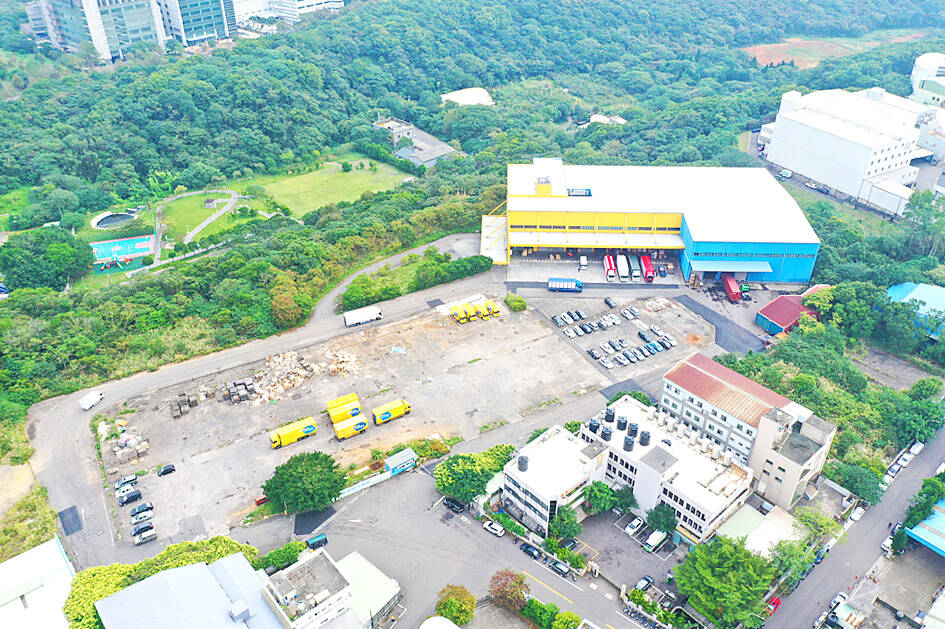Land prices in Taiwan’s industrial parks grew steeply in the past five years, which was driven by global supply chain realignment, reshoring of Taiwanese firms and demand from foreign technology firms, property consultancy Colliers International Taiwan (高力國際) said in a report yesterday.
The trend might sustain and lend more support to industrial land prices despite slow transactions this year, as firms spend cautiously amid economic uncertainty, Colliers said.
Industrial land transactions totaled NT$651.2 billion (US$20.4 billion) in the past five years with prices more than doubling in areas where land prices were previously cheap, Colliers said, after surveying 15 industrial parks in New Taipei City, Taoyuan, Hsinchu, Taichung, Tainan and Kaohsiung.

Photo courtesy of Colliers International Taiwan
Land prices soared by 20 percent to 125 percent and the increases were most conspicuous in southern Taiwan owing to low bases, it said.
Land prices for Kaohsiung’s Benjhou Industrial Park (本洲產業園區) spiked more than twofold, followed by Tainan’s Madou Industrial Park’s (麻豆工業區) 89 percent increase and Kaohsiung’s Dafa Industrial Park’s (大發工業區) 56 percent gain, it said.
The pace of growth reached 20 percent elsewhere in the nation, it said.
Taoyuan, with 34 industrial parks, tops other special municipalities in both industrial land supply and demand, consistent with its status as Taiwan’s manufacturing hub, Colliers said.
Industrial land deals in Taoyuan amounted to NT$158.7 billion from 2018 to the first half of this year, driven by reshoring of manufacturing facilities previously in China in the wake of US-China trade frictions, it said.
Hsinchu, Taichung, Tainan and Kaohsiung also benefited from supply chain realignment and capacity expansions of major local tech firms, it added.
By value, industrial plots in New Taipei Industrial Park (新北產業園區) ranked as the most expensive at NT$950,000 to NT$1.1 million per ping (3.3m2), it said, adding that Tucheng Industrial Park (土城工業區) and Hwa Ya Technology Park (華亞科技園區) tied for second place at NT$550,000 to NT$600,000 per ping.
Linkou Gong’er Industrial Park (林口工二工業區) was in the third place at NT$450,000 to NT$500,000 per ping, Colliers said.
It is no longer possible to find industrial plots valued at below NT$100,000 per ping anywhere in Taiwan, it said.
Industrial output at the Southern Taiwan Science Park (南部科學園區) hit NT$458.4 billion in the first four months of this year, surpassing that at Hsinchu Science Park (新竹科學園區) and Central Taiwan Science Park (中部科學園區), after semiconductor equipment supplier ASML Holding NV, chipmaker United Microelectronics Corp (聯電) and Applied Materials Taiwan added a presence, it said.
The southward migration of property funds would continue, thanks to a lack of land supply and increasing unaffordability in northern Taiwan, it said.

CAUTIOUS RECOVERY: While the manufacturing sector returned to growth amid the US-China trade truce, firms remain wary as uncertainty clouds the outlook, the CIER said The local manufacturing sector returned to expansion last month, as the official purchasing managers’ index (PMI) rose 2.1 points to 51.0, driven by a temporary easing in US-China trade tensions, the Chung-Hua Institution for Economic Research (CIER, 中華經濟研究院) said yesterday. The PMI gauges the health of the manufacturing industry, with readings above 50 indicating expansion and those below 50 signaling contraction. “Firms are not as pessimistic as they were in April, but they remain far from optimistic,” CIER president Lien Hsien-ming (連賢明) said at a news conference. The full impact of US tariff decisions is unlikely to become clear until later this month

GROWING CONCERN: Some senior Trump administration officials opposed the UAE expansion over fears that another TSMC project could jeopardize its US investment Taiwan Semiconductor Manufacturing Co (TSMC, 台積電) is evaluating building an advanced production facility in the United Arab Emirates (UAE) and has discussed the possibility with officials in US President Donald Trump’s administration, people familiar with the matter said, in a potentially major bet on the Middle East that would only come to fruition with Washington’s approval. The company has had multiple meetings in the past few months with US Special Envoy to the Middle East Steve Witkoff and officials from MGX, an influential investment vehicle overseen by the UAE president’s brother, the people said. The conversations are a continuation of talks that

CHIP DUTIES: TSMC said it voiced its concerns to Washington about tariffs, telling the US commerce department that it wants ‘fair treatment’ to protect its competitiveness Taiwan Semiconductor Manufacturing Co (TSMC, 台積電) yesterday reiterated robust business prospects for this year as strong artificial intelligence (AI) chip demand from Nvidia Corp and other customers would absorb the impacts of US tariffs. “The impact of tariffs would be indirect, as the custom tax is the importers’ responsibility, not the exporters,” TSMC chairman and chief executive officer C.C. Wei (魏哲家) said at the chipmaker’s annual shareholders’ meeting in Hsinchu City. TSMC’s business could be affected if people become reluctant to buy electronics due to inflated prices, Wei said. In addition, the chipmaker has voiced its concern to the US Department of Commerce

STILL LOADED: Last year’s richest person, Quanta Computer Inc chairman Barry Lam, dropped to second place despite an 8 percent increase in his wealth to US$12.6 billion Staff writer, with CNA Daniel Tsai (蔡明忠) and Richard Tsai (蔡明興), the brothers who run Fubon Group (富邦集團), topped the Forbes list of Taiwan’s 50 richest people this year, released on Wednesday in New York. The magazine said that a stronger New Taiwan dollar pushed the combined wealth of Taiwan’s 50 richest people up 13 percent, from US$174 billion to US$197 billion, with 36 of the people on the list seeing their wealth increase. That came as Taiwan’s economy grew 4.6 percent last year, its fastest pace in three years, driven by the strong performance of the semiconductor industry, the magazine said. The Tsai